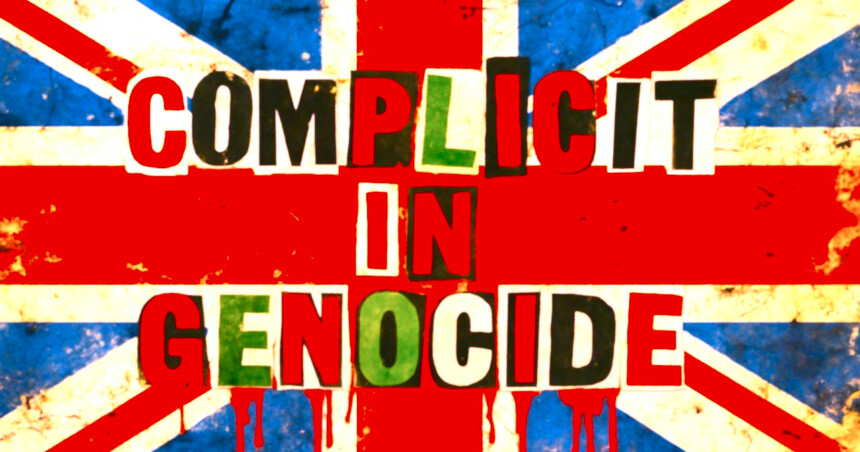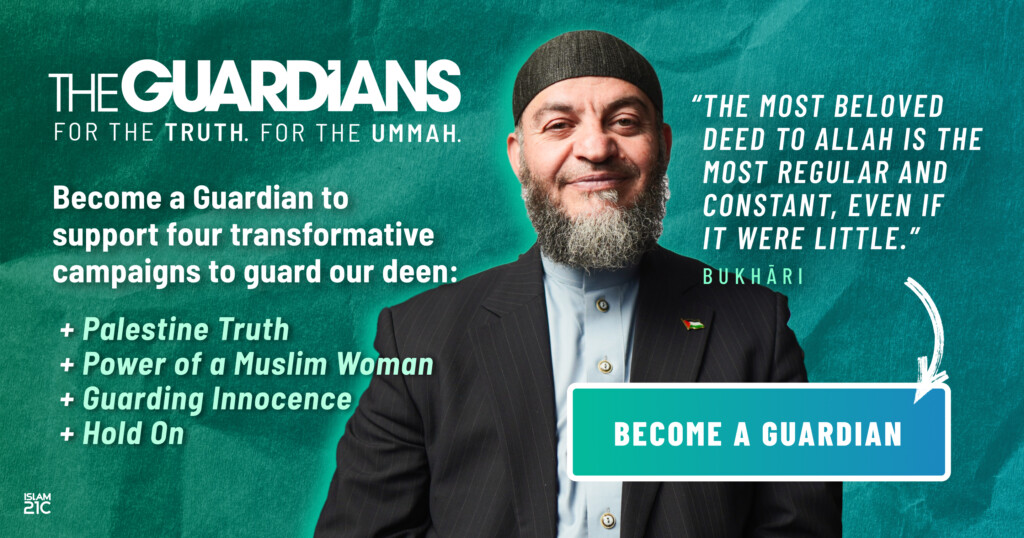The Ummah is suffering a genocide in Gaza, Palestine. Betrayed by our own and trapped in the grip of the enemy, defenceless and completely surrounded with no sanctuary or line of retreat. Neither here nor there, but everywhere, in collective limbo. Globally cornered. By what other means might fate have brought us here? If not for the cultural bankruptcy stemming from the century-old Ottoman military defeat (brought about principally) by Arab nationalist rebels, the shattered Muslim world and extermination of the Palestinian people would not have been possible.
The Prophetic reason for these dystopian, forsaken times, leading to our oppression and exploitation by antagonistic nations, dividing up our resources among themselves — as though friends seated around a dining table sharing a single dish — is a manifest consequence of our epidemic love for the material world. True to the last detail, despite the strength of our numbers, we are like the sea’s forgotten refuse washed up on the shore, weak of will and self-serving, and ultimately driven by our paralysing terror in the face of mortality. We’re neither feared nor regarded, as we have been softened through the lure of entertainment and enchanted by the seduction of fast cash and uninterrupted enjoyment and leisure.
Here at home in Britain, against the backdrop of darkening storm clouds of civil anarchy looming on the horizon, crowds of native racists riot outside hotels housing illegal economic migrants. The blowback of over half a century of regime change foreign policy has stirred up a hornet’s nest of economic and civil unrest within Western nations. And the tension meter is still climbing. Right-wing news media networks are on the rise, pulling in a widening segment of the public. While the air thickens with tension, coming into sight on the bleak landscape, bound in common purpose, is the likely reality of the Reform UK MP Nigel Farage, in the near future, becoming the nation’s first-ever 21st century openly fascist Prime Minister. Foreshadowing signs that tell us things here are falling apart.
These outlooks of hostility may trigger a few hard-hearted members of our faith to dispute the need to involve our voices in overseas issues for the worry and preservation of their own safety. They might typically argue in silence: before we concern ourselves with politics and international affairs, let us consider the fact that our own walls are crumbling. First, we must look to ourselves. Let us address the circumstances within “our own borders”. The problems on our own doorstep. In spite of the ghost of old narratives and the internalised whisper of self-doubt, however, the idea of rebuilding unity is re-inventively being acknowledged by a mounting number of our ex-pacifist brethren.
Ever since the advent of social media laid bare the realism of democratic-state terrorism, popularising the true source of Middle East instability, Muslim attitudes have been evolving. Extensive online audio-visual evidence shows there exists a considerable willingness within the infected body of our nation to want to heal the era of turmoil and get back to a transnational non-sectarian Islamic identity. Whether it is done willingly or going with the flow, regardless, increasing numbers of people are re-embracing this abandoned faith principle, adapting to the ideal that Godly devotion knows no walls, borders, or lines in the sand.
As much as social media functions as another tool for idle entertainment and mindless distraction, it can be equally educational and profoundly truth revealing, easing the path to comprehending harsh realities. The public digital sphere has induced the appetite around the need to repair that which impairs the imagination and divides us. Enough that individual initiatives from across continents are standing up and contributing to this realisation. Initiating steps in a positive direction. Pursuing progressive objectives. Trying to build something better. Taking direct action. Without a doubt, things are going from bad to worse although, ironically, it’s impossible to ignore that in the midst of the Ummah’s calamity a re-evaluation of values is also taking place.
It is long overdue for the Muslim world to reclaim the heart of its religious intellectual capital, advocates Joseph Lumbard, Associate Professor of Qur’ānic Studies at Hamad Bin Khalifa University in Doha, Qatar. In order to return the Ummah to a popular world-view underpinned by classical Islamic reason, emancipate our minds from inherited servitude, and restore the sacred order of dominant rhetorical logic — we must overcome the internalised crisis of borrowed paradigms, and transcend the practice of performative discourse and reactive open critique which remains thoroughly ingrained in our diasporic culture.
In his scholarly awakening article Decolonizing Qur’ānic Studies (2022), and Islam and the Challenge of Epistemic Sovereignty (2024), published online in the journal Religions, Lumbard — a Muslim-American author of numerous studies on Islamic thought — points out that although “Muslim lands are no longer directly colonized, intellectual colonialism continues to prevail” within Muslim world academic institutions influenced by the “Euro-American” university.
These factories of knowledge creation, in the domain of higher education across the majority Muslim world, he explains, exist as neoliberal secular-driven institutes, established not to honour cross-cultural scholarship and present research findings as fact (in line with ethical standards), but rather to undermine a classical analytical tradition rooted in almost fifteen-hundred years of Islamic study.
Lumbard asserts in his overall position, it is better for those few Western academics using Qur’ānic tafsīr as a propaganda engine to promote their ideological goals, to engage more fully with genuine historical insight, rather than retreating into fanatical resistance in the growing midst of legitimate and revisionist Islamic literature rapidly coming out of the Muslim world. Suggesting the path towards restoring the everyday practical application of our intellectually rich heritage back into mainstream practice will, in turn, allow the wisdom of past generations to inform the ethical direction of our urgent engagement with resolving contemporary Ummah societal concerns.
Lumbard’s paradigm-shifting articles ethically rise above some of his past “diplomatic” writings, which appeared in the early 2000s to take the symbolic knee, under the weight of pressure from the media and sociopolitical backlash, following the 9/11 revenge attacks on the declining empire — the United States of America. He presents, however, an intellectually credible, meaningful lens through which to understand an important aspect of our identity and plight of our religious diaspora.
For overcoming adversity and shielding his newfound faith from appropriation, the 56-year-old scholar of Qur’ānic studies deserves recognition and praise, although more importantly, assistance from those wielding influence and power — those uncommon good-intended people in positions of authority, within Muslim society, to frame the terms of debate and set in motion the required legislation to safeguard our sacred texts from exploitation, to carry forward Lumbard’s noble coming-of-age Islamic National project.
Like in the case of excessive activism or anything done without moderation, Western academia, of course, tends to raise claims and assert critique without offering practical answers to societal challenges. The intellectual tradition of the West may well have cheapened the foundation of learning and pursuit of truth, though not everyone needs to be the one to call it out. While it could prove worthwhile for some to confront militant secularism in mainstream academia, the rest of us cannot afford to get caught up in areas outside our rank of competencies.
God bless the one who knows their own limits.”
The same applies to all aspects of contention in post-religious societies, where the civil right to enter into ideological confrontation has become something of a ritual for those of our faith carrying the same burdens. It would be wise for our rogue romantic revolutionaries both at home and abroad to understand: a society cannot come together, let alone thrive, on the participation of polemics alone. Merely calling out BS or one’s antagonist and winning arguments won’t solve our problems. Nor should every conversation be turned into a battle ground. There’s more to life than participation in overworked verbal refutation.
Regrettably, at everyone else’s expense, some asserting the defence of the faith have built an immoderate personality around simplistically refuting what they perceive as controversial and intolerable in society. We mustn’t become guardians of cult tradition rather than pursuers of the truth. Plenty in the brotherhood report feeling put off by self-styled community leaders assuming the voice of the masses, while confusing us all with their infinite incoherent thoughts. Not excluding the growing wave of resentment from those fed-up voices who object to the sensationalist charismatic kind, popping up on their smart TV screens, relentlessly appearing to position themselves as though their opinions are universally accepted facts. If only they understood their limits.
But behind the Redeemer persona, one cannot hide his impotence in public intellectual intercourse. He has either got what it takes to participate meaningfully in the public realm of ideas or not. The production output of dysfunctional dialogue and craft deficiency is itself conclusive. In any case, the popular culture of finger-pointing activism and manufactured controversy done under the banner of preserving the sanctity of faith — more often than not — reeks of vanity. It comes across more performative than selfless community service.
In truth, striving towards our ideals must be matched by realism. We cannot build strategy on coincidence and illusion. The needs of the collective take priority over the individual. The fringe heretic actions of those in the Qur’ānic cautionary tale of Bani Isrā’īl constitute prime examples for us to review and consider how closely the story today still mirrors Muslim society. Besides, a disunited society cannot merely lobby others for its rights, legislate empathy using media spin, play the victim up on the stage in every debate and discussion or, for that reason, manufacture culture by wasting energy on fighting theoretical wars that are pointless and disconnected from public sentiment.
For that, we need perspectives which tell a story with all the senses to communicate meaning. Timeless language that stirs the collective imagination, and which resonates with the way people perceive the world. A soul behind the message. Words with their boots on. Our society is in need of pragmatism, longing for guidance rooted in lived experience. Experiences that inspire the reader to wake up and take progressive action. In precise terms, the measures necessary to foster organic change.
In times like these, those pacifists deciding not to take sides only ends one way, eventually cornered by consequences. Let us pray for the common-sense among us to acknowledge our limits and face our shortcomings as we reckon with the Ummah’s suffering and our humiliating predicament of merely being docile spectators to the atrocities inflicted upon the Palestinians in Gaza.
Source: Islam21c








Last will of the martyr Anas
“This is my will and my final message. If these words reach you, know that Israel has succeeded in killing me and silencing my voice.
First, peace be upon you and God’s mercy and blessings.
God knows I gave every effort and all my strength to be a support and a voice for my people, ever since I opened my eyes to life in the alleys and streets of the Jabalia refugee camp. My hope was that God would extend my life so I could return with my family and loved ones to our original town of occupied Asqalan (Al-Majdal). But God’s will came first, and His decree is final.
I have lived through pain in all its details, tasted suffering and loss many times, yet I never once hesitated to convey the truth as it is, without distortion or falsification—so that God may bear witness against those who stayed silent, those who accepted our killing, those who choked our breath, and whose hearts were unmoved by the scattered remains of our children and women, doing nothing to stop the massacre that our people have faced for more than a year and a half.
I entrust you with Palestine—the jewel in the crown of the Muslim world, the heartbeat of every free person in this world.
I entrust you with its people, with its wronged and innocent children who never had the time to dream or live in safety and peace. Their pure bodies were crushed under thousands of tons of Israeli bombs and missiles, torn apart and scattered across the walls.
I urge you not to let chains silence you, nor borders restrain you. Be bridges toward the liberation of the land and its people, until the sun of dignity and freedom rises over our stolen homeland.
I entrust you to take care of my family.
I entrust you with my beloved daughter Sham, the light of my eyes, whom I never got the chance to watch grow up as I had dreamed.
I entrust you with my dear son Salah, whom I had wished to support and accompany through life until he grew strong enough to carry my burden and continue the mission.
I entrust you with my beloved mother, whose blessed prayers brought me to where I am, whose supplications were my fortress and whose light guided my path. I pray that God grants her strength and rewards her on my behalf with the best of rewards.
I also entrust you with my lifelong companion, my beloved wife, Umm Salah (Bayan), from whom the war separated me for many long days and months. Yet she remained faithful to our bond, steadfast as the trunk of an olive tree that does not bend—patient, trusting in God, and carrying the responsibility in my absence with all her strength and faith.”
I urge you to stand by them, to be their support after God Almighty.
If I die, I die steadfast upon my principles. I testify before God that I am content with His decree, certain of meeting Him, and assured that what is with God is better and everlasting.
O God, accept me among the martyrs, forgive my past and future sins, and make my blood a light that illuminates the path of freedom for my people and my family.
Forgive me if I have fallen short, and pray for me with mercy, for I kept my promise and never changed or betrayed it.
Do not forget Gaza…
And do not forget me in your sincere prayers for forgiveness and acceptance.”
– Anas Jamal Al-Sharif